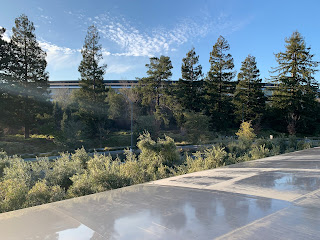Today is Groundhog Day, when Phil, the groundhog from Punxsutawney, PA, predicts the weather for the next six weeks (cold if he sees his shadow, warm if he does not, and he did see his shadow.)
Today also celebrates the 30th anniversary of the movie, released on February 4, 1993.
Groundhog Day was well-received when it came out and has grown in esteem to the extent that it is now considered to be one of the top films of all time. At its center is a vision of the meaning of life, but it is enclosed in a comedic wrapping that can be enjoyed on its own merits. As I wrote
seven years ago:
Groundhog Day was a quirky custom in an out-of-the-way town--it didn't rise in the popular consciousness until the
1993 film.
I came across the movie on HBO in 1996. At first glance it was a cleverly written comedy about a jaded, world-weary weatherman who mysteriously must re-live Groundhog Day over and over again.
Bill Murray's character, Phil Connors, is trapped. Even when he despairingly "kills" himself he wakes up the next morning in the same hotel bed to the strains of Sonny and Cher's "I Got You Babe" on the clock-radio.
Phil-the-human cannot escape, yet in a sense he is totally free. He can commit any number of sins without consequence because he will have a fresh start tomorrow. No one but he remembers what he did.
Repeated viewings struck a chord. The movie plumbed deep waters. And
I'm not alone in that realization.
In the years since its release the film has been taken up by Jews, Catholics, Evangelicals, Hindus, Buddhists, Wiccans, and followers of the oppressed Chinese Falun Gong movement. Meanwhile, the Internet brims with weighty philosophical treatises on the deep Platonist, Aristotelian, and existentialist themes providing the skin and bones beneath the film’s clown makeup.
theology professor Michael P. Foley wrote that Groundhog Day is “a stunning allegory of moral, intellectual, and even religious excellence in the face of postmodern decay, a sort of Christian-Aristotelian Pilgrim’s Progress for those lost in the contemporary cosmos.”
The movie ends on a hopeful note. Phil makes positive changes of his own free will, without expectations of a reward. Only then is he released from the prison of endless repetition.
Part of the genius of Groundhog Day, the movie, is that it doesn't pummel you with philosophy. It invites you to think, but if you just want to laugh, that's ok, too. As Jonah Goldberg observes,
We’re talking about the movie in which Bill Murray tells a big rat sitting on his lap, “Don’t drive angry,”
Further musings in 2023 about Phil Connors' journey and our own:
In the film — written by Danny Rubin, a Zen Buddhist, according to Ramis’ DVD commentary of the film — Phil reincarnates each day, but he also transforms his behavior over “time.” He takes self-centered advantage of his unique predicament — robbing bank trucks, stuffing his face with angel food cake, tricking a woman into bed — but eventually perfects the day with creative self-improvement tasks and compassionately helping others. Once he becomes the best possible version of Phil Connors, he is released from his temporal prison, while simultaneously winning the love of his virtuous producer, Rita...
But something does change every day, even if it’s imperceptible. It’s ourselves. And we can choose how this day will unfold, and how we will slowly evolve. There might even be a “Groundhog Day”-inspired resolution: memorizing French poetry, playing the piano, figuring out how to help others more often. Like Phil, we can utilize creativity and compassion to change a glass-is-half-empty paradigm, to half full. The pursuit of meaning is itself meaningful. And today, as well as everyday, can be your first day of spring.
Wow, that's heavy! But putting it in perspective,
Groundhog Day is also just about a big rat.

































